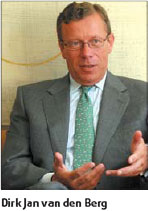Close relations fostered over 35 years
A year ago, Dirk Jan van den Berg was in Wuyishan, Fujian Province. He was there not only as a tourist to bask in the breathtaking beauty of the landscape, but also as ambassador of the Netherlands to open a special school. It was the first Sino-Dutch Friendship School in China.
The school was made possible by a donation from Wang Shixiang, who, in turn, had been awarded by the Prince Claus Fund, a major platform for intercultural exchange in the Netherlands. Wang, into his 90s, is an eminent preserver of cultural relics and used his prize money of 100,000 euros ($135,000) to renovate a school of his birthplace.

Van den Berg is always heartened to see grassroots efforts that promote mutual understanding between Dutch and Chinese people. In the 35 years that his country has had diplomatic relations with the People's Republic of China, "what is particularly successful in our cooperation is that we have clearly found ways to develop our relationship in many areas," he says. He listed economic, scientific, cultural and political dialogue as good examples.
Van den Berg is impressed by China's high growth rate, which he feels is necessary to solve many of the social or economic problems. While growth solves problems, he adds, it also generates its own problems. The cost to the environment has been recognized, he notes, "but words need to be turned into action and this should be done on a much larger scale than at the moment".
To describe Dutch perception of the China phenomenon, Van den Berg used the phrase "the dragon is biting its own tail", explaining that it takes a lot of money to generate development, which also incurs problems.
Another argument he has: increased wealth needs to be more evenly distributed among the Chinese people to ensure social stability. "Economic growth can be sustained if China further opens its financial sector to foreign competition, which is a complicated and delicate issue." China can "profit from our experience and insight."
Technology can help, Van den Berg emphasizes. "The Netherlands, with strength in this field, is making propositions that could be of interest to the Chinese. But we need to look at it in a comprehensive way, combining research with marketable products. We're discussing food and nutrition, energy transition, creative industries and environmental technology with our Chinese counterparts."
There are problems, though. "Technology is a marketable commodity. Since it is mostly 'software', some in China tend to be unwilling to pay for something they cannot see. It is not just an issue of technology transfer, but one of commercial proposition," Van den Berg maintains.
Netherlands-headquartered multinationals such as Philips, DSM and Royal Dutch Shell have been "demonstrators of good business practices," he adds. "There is a new program in the area of food and nutrition that will be carried out through the years. We are now working on specific cooperation projects between Chinese and Dutch research institutes to get more substance from them. It is promising because China is beginning to invest in research."
Perception of China
As Chinese goods are available in more places of the world and Chinese tourists swarm to other countries, there is the issue of perception. Van den Berg suggests China engage in more public diplomacy by "opening up and explaining to the world what is going on in this country" and "to reassure people in other parts of the world". The "fundamentals" about China are positive, he says, and it will go "in the right direction" if China keeps the dialogue going.
Speaking of the 2008 Beijing Olympics, Van den Berg says "people in the Netherlands are looking forward to it. We'll bring in a team of 240 athletes to participate. We'll enjoy it and we're quite ambitious. We'll gain a lot of medals, though not as many as China." But he adds that the Olympics will "not only be a sports event, but much more. A lot of people will come and write about China. Figuratively, the country will be in the open."
There is a gap between how Europeans perceive China and the reality in the country, he admits. When many of his friends first came here, they were "flabbergasted" when they saw very modern metropolises. "It was an eye opener," he says. But he advises that, to have a complete picture of China, one needs to travel outside the big cities and go to places like a small village in Inner Mongolia, where he found that the traditional way of human interaction had been kept intact and where everybody knew everybody else, unlike in urban areas.
On how ordinary Chinese can know his country better, the ambassador recommends CCTV2's documentary series Rise of the World's Powers as a primer. "It includes an excellent episode on the history of the Netherlands," says Van den Berg. "That'll give you some basic understanding of our country. If you don't have a point of reference, it'll be difficult to proceed further."
(Shanghai Start 09/28/2007 page1)














